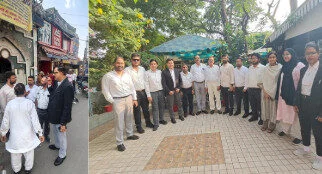The Association for Protection of Civil Rights (APCR)has raised serious concerns over alleged human rights violations and misuse of police power in several districts of Uttar Pradesh following recent incidents of unrest. While talking to Radiance after a fact-finding visit to nine districts, APCR National Secretary Nadeem Khansaid that the team found widespread irregularities in police actions and procedural lapses that amount to a violation of constitutional guarantees.
Khan said the APCR delegation visited Kanpur, Bareilly, and several other districts to meet victim families and assess the ground situation. “According to official data, 22 FIRs have been filed naming 1,324 people, but when we examined the FIRs, the total number of accused seems closer to 2,000,” he said.
He pointed out that most cases were registered under sections related to unlawful assemblyor religious enmity, but there was “no specific mention of any slogan like ‘I Love Muhammad,’” as some reports suggested. “There is no section in the law that criminalises such a slogan,” Khan clarified, alleging that cases were being framed under broad or unrelated provisions.
“The sad thing is that the entire due process is not being followed anywhere,” Khan said. “In the name of maintaining law and order, the police have been targeting one community while the media headlines call them ‘rioters.’ But who is the rioter if there was no clash between two communities?”
The APCR report further claims that Section 144, which prohibits the assembly of four or more people, was imposed after the police filed FIRs. “In places like Unnao, Kanpur, and Bareilly, Section 144 was not in effect when people gathered. It was invoked later to justify the charges of unlawful assembly,” Khan alleged.
He also accused the authorities of using bulldozers and sealing Muslim-owned properties without followingSupreme Court guidelines or court procedures. “In Bareilly, 32 shops belonging to the Waqf Board were sealed by the Nagar Nigam while a related case is sub judice in the Allahabad High Court,” Khan said. “The police entered suddenly and sealed the shops, trapping people’s goods and belongings inside. This is happening at a time when more than a hundred people have been arrested, including many minors.”
APCR has also raised alarm over what it describes as the criminalisation of religious expression. Khan stated that in several places like Meerut, Mawana, and Kashiput, individuals were booked under Section 151 merely for having “I Love Muhammadﷺ” stickers on their vehicles or houses. “This is a shocking misuse of power,” he said.
He further alleged that detainees were being subjected to “third-degree torture.” “In Godhra and Kashipur, people were beaten and humiliated publicly, tied with ropes and dragged out,” Khan said. “This kind of treatment without proper investigation or evidence shows a complete breakdown of the rule of law.”
Calling the situation a “constitutional crisis,” Khan urged both the state and central authorities to intervene. “The Supreme Court has repeatedly reminded governments that India is ruled by law, not by might. But in Uttar Pradesh today, that principle is being violated every day,” he said.
The APCR has announced that it will submit its findings and recommendations to the National Human Rights Commission and approach the judiciary if necessary. “Our Constitution guarantees equality and justice. What we are witnessing in UP undermines both,” Khan concluded.
The recent visit to UP was prompted by reports of mass arrests, property demolitions, and alleged targeting of members of the Muslim community following local disturbances.


